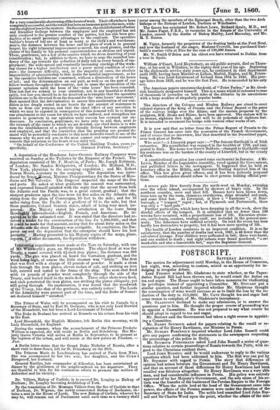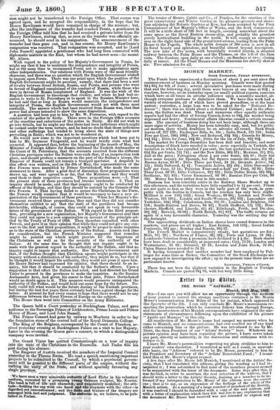POSTSCRIPT.
SAT17EDAY AITERNOON.
The motion for adjournment until Monday, in the House of Commons, last night, was according to custom, seized as an opportunity for in- dulging in irregular debate. Lord FERAIOY wished Mr. Gladstone to state whether, as the Paper- duties Repeal Bill had been thrown out, he would remit the duties on tea and sugar. The House ought to have taken measures for vindicating its privileges instead of appointing a Committee. Mr. STEUART put a similar question, and further inquired whether Mr. Gladstone thought the consumption of wine would increase so as to limit the loss by the re- duction of the duty to 515,000/. Mr. CAVE thought tea and sugar had. some reason to complain of Mr. Gladstone's inconstancy. Mr. GLADSTONE declined to make any admissions, or to answer the questions put to him. He thought the proper course of proceeding was to appoint a Committee. He was not prepared to say what course he should adopt in regard to tea and sugar.
Mr. BRIGHT said the Government had taken a right course in appoint- ing a Committee. Mr. DANDY SEYMOUR asked for papers relating to the recall or re-
signation of Sir Henry Rawlinson, our Minister in Persia. '
Mr. Dun mie FORTESCUE inquired whether Lord John Russell could give any papers confirming the statements in the newspapers respecting the proceedings of the police in Sicily. Mr. SEYMOUR FITZGERALD asked Lord John Russell a series of ques- tions relative to certain proceedings of Russia towards the Porte, with re- gard to the Christians resident there. Lord Ions( RUSSELL said he would endeavour to reply to the various questions which had been addressed to him. The first was one put by Mr. Seymour with regard to Persia. The story that differences'of opinion had arisen between the Government and Sir Henry Rawlinson, and that on aceount of thosi differences Sir Henry Rawlinson had been recalled was fabulous altogether. Sir Henry Rawlinson was a very able man, and had considerable influence in Persia. His-policy was entirely approved of by her Majesty's Government, and the sole cause of his re- turn was the transfer of the businessof the Persian Empire to the Foreign Office. When the noble lord at the head of the Government came into power, the affairs of the Persian mission were under the direction of the Secretary of State for India. The noble lord consulted Lord John Rus- sell and Sir Charles Wood upon the point, whether the affairs of the mis- sion might not be transferred to the Foreign Office. That course was agreed upon', and he accepted the responsibility, in the hope that Sir enry Rawlineon would have remained in charge of the mission., but, after the intelligence of the transfer had reached Persia, a gentleman in
the Foreign Office told him that he had received a private letter from Sir Henry Rawlinson, stating that, as soon as the transfer was officially an- nounced, he should send in his resignation. The announcement of the transfer had then gone out, and in due course, Sir Henry Rawlinson's resignation was received. That resignation was accepted, and he (Lord John Russell) appointed a gentleman who had long been connected with diplomatic matters in the East, but whom he had never seen—he meant Mr. Alison.
With regard to the policy' of her Majesty's Government in Persia, he might say that it has to maintain the independence and integrity of Persia, but at the same time to recommend Persia not to make aggressions upon other independencies. Our relations with Persia were of the most friendly character, and there was no question which the English Government wished to impose upon Persia. There was one point upon which the position of the English Government might be peculiar, namely, that there had been a sort of rivalry between Great Britain, Russia, and Persia, and persons who were in favour of England complained of the conduct of Russia, while those who were in favour of RUBEL% complained of England. It was the wish of the English Government to discourage that rivalry, and when he had had oc- casion to write to St. Petersburg or to speak to the Russian Minister here, he had said that so long as Russia would maintain the independence and integrity of Persia, the English Government would act with them most cordially. The answer which had been received from Russia was, that that power had always intended to show the same disposition. A question had been put to him by Mr. W. Fortescue, with regard to the conduct of the police in Sicily. There were in the Foreign Office accounts of the cruelties and extortions of the police in Sicily. He did not wish to go into details, but he might say that there had been inflictions which might be ranked under the term torture, and he had no doubt that those inffictions and other toufferings had tended to bring about the state of things now prevailing in Sicily, which was not to be wondered at. He would now come to the important questions which had been put to him by Mr. Seymour Fitzgerald, and he would briefly state what had occurred. It appeared that, before the beginning of the month of May, the Minister of Foreign Affairs for Russia informed the Turkish Ambassador at the Court of St. Petersburg, that the accounts received from the different Christian provinces under the Sultan were such that, if an insurrection took place, and should produce a massacre on the part of the Sultan's troops, the Emperor of Russia could not remain a tranquil spectator. A despatch to this effect was written, and on the 5th of May, the representatives of the five Powers were assembled by Prince Gortschakoff, who made the same statement to them. After a good deal of discussion three propositions were drawn up, and were agreed to so far, that the Ministers said they would send them to their respective courts. These propositions were :-1. That the present state of these provinces had become intolerable. 2. That an inquiry should be made, and that that inquiry ought to be conducted by officers of the Sultan, and that they should be assisted by the Consuls of the five Powers. 3. That having failed to secure the Christians in the Porte, the Powers would consider that it would be necessary to have a new or- ganization of the Government of those provinces. When her Majesty's Go- vernment received those propositions, they said that they did not consider themselves entitled to say that the date of the provinces had become intolerable, although, of course they could not speak it, very favourable terms of the government of the Sultan. With regard to the third proposi-
tion, providing for a new organization' her Majesty's Government said that they could not agree to a new organization on account of the principle set- tled by the Treaty of PErie of 1856. They therefore consulted with other
Powers, end gave it as their opinion that while they could not give any con- sent to the first and third propositions, it might be proper to make inquiries as to the state of the Christian provinces of the Sultan. Austria took time for consideration, but the French Minister suggested that remedies might be pointed out which might provide for the happiness of the Christians as well as for the security of the authority of the Sultan. At the same time he thought, that any inquiry ought to be made with the greatest regard to the authority of the Sultan, and that no inquiry ought to impair that authority, Iler Majesty's Government said that, if the Sultan thought that Christian agents might participate in the inquiry without g diminution of his authority, they might do so, but that if he thought it would impair his autherity, they would not press it upon him. Sir Henry Bulwer had expressed his opinion, that there should be an in- quiry, but that it should be conducted by the Sultan's officers. Upon a suggestion to that effect the Sultan had acted, and had directed his Grand Vizier to proceed to the provinces to make the inquiries. As the Russian Ambassador here, had given his accent to that plan, Prince Gortschakoff would no doubt agree to it. This measure would preserve unimpaired the authority of the Sultan, and would hold out 801311) hope for the future. No- body could tell what would be the future destiny of the Turkish provinces, but during the last few years there certainly had been a great change for the better. At present he had every reason to hope that there would not be any differences between the Great Powers of Europe on the subject. The House then went into Committee on the Army Estimates. .



























 Previous page
Previous page